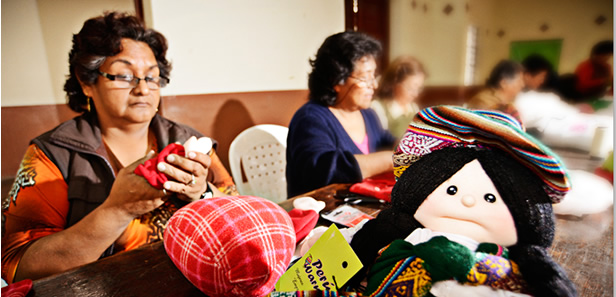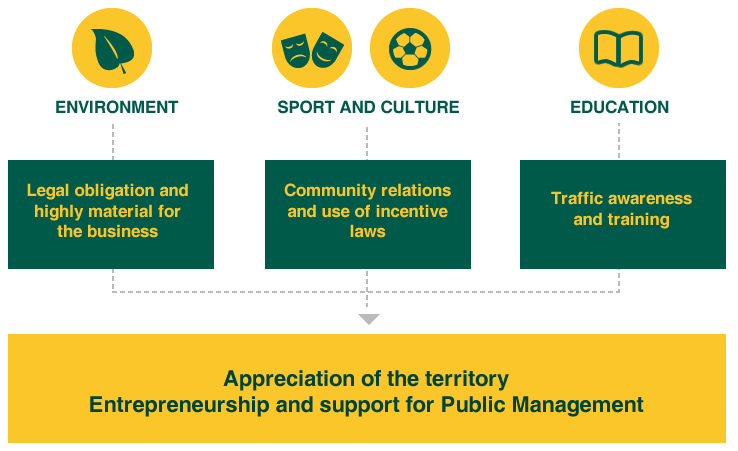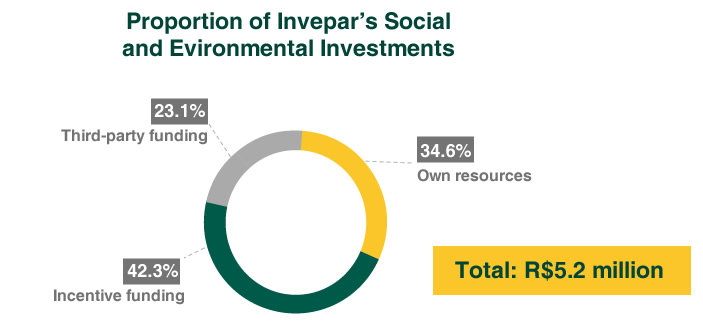Social and Environmental Responsibility
Invepar Institute
The organization is a vehicle for Invepar’s community actions. It focuses on education, the environment, culture and sports, with support for public administration and entrepreneurship as transverse themes.

Owing to the nature of its business, Invepar has an impact on its concessions’ surrounding communities. Given their public nature, these concessions require a matching contribution which, in the developing countries at least, transcends the provision of good services and includes social and environmental development.
Since 2002, these initiatives have been managed by the Invepar Institute which, in line with its Social and Environmental Responsibility Policy, focuses on three key areas for the development and improvement of impacted areas: education, culture and sport, and the environment, with support for public administration and entrepreneurship as transverse themes.
Social and Environmental Responsibility Policy
“Through its institute, Invepar formulates its social responsibility principles and guidelines and articulates such actions in line with Company values, generating social, economic and environmental benefits in its surrounding communities and in society as a whole.”
Guidelines
- Social and environmental responsibility is a firm Invepar commitment, inherent to the way its companies operate, which is guided by the Invepar Institute through specific standards and procedures.
- Social and environmental responsibility at Invepar is a recognized and valued competency to be applied at all levels.
- The Invepar Istitute has a duty to provide technical support for the group’s companies, promoting opportunities and guidelines, clarifying and encouraging internal and external social actions and initiatives.
- An understanding of the social, economic and environmental situation in Invepar’s areas of operation and the companies’ effective participation in the socio-territorial dynamic is imperative.
- Expansion of the Company’s capacity for social and environmental action through partnerships with other companies and public or private institutions operating in the region.
Examples of such initiatives:
GRI [EC9]
- Social and environmental pre-diagnosis in the Company’s operational regions;
- Raising public and private resources in the social and economic area aiming to set up local social networks;
- Identification of local talent and vocations to enhance social capital in the area;
- Establishing an emergency action plan to meet the demands of communities impacted during the implementation period of new businesses;
- Sustainable community land-development projects implemented through participatory methods;
- Sustainable management through which the Institute advises group companies on commitment to UN Millennium Goals and Global Compact principles.
- INVEPAR INSTITUTE – FOCUS OF OPERATION
- INVESTMENTS
- PROJECT SELECTION NOTICES
- SUPPORTED PROJECTS
- NA MÃO CERTA (ON THE RIGHT TRACK PROGRAM)
INVEPAR INSTITUTE – FOCUS OF OPERATION

NEW DEPARTMENT AND COMMITTEES
In 2012, Invepar was strengthened by the addition of the Corporate Social Responsibility Executive Department, whose aim is to ensure that social responsibility management is more aligned with the concept of sustainability, in which social, economic and environmental performance play an equal role in ensuring the Company’s longevity.
The Company also receives support from the Social Responsibility Committee at corporate level, and Internal Social Responsibility Committees within each group company. Representatives from both bodies maintain constant contact to exchange information and experience, plan actions and jointly define strategies, targets and objectives. These committees normally include managers from the Human Resources, Corporate Governance, Communications, Procurement and HSE departments.
| Instituto Invepar | ||
| Mission | Vision | Values |
To mobilize and support the corporate social responsibility initiatives of Invepar companies by articulating their actions and strengthening the social investment results. |
To be a national benchmark for social and environmental responsibility through articulating partnership networks and social technologies, thereby contributing to sustainable development. |
Identical to Invepar’s:
|
INVESTMENTS
The Institute formulates its financial planning based on the local diagnosis of group companies and business compliance. Operating expenses are met by the companies on an apportionment basis, using the previous budget as a reference, and proportional to the projects to be executed. Resources are also obtained through partnerships with other companies, associations and foundations.
Further project financing comes from the companies’ own resources through the FIA (Children’s and Teenagers Fund) and the Rouanet Law, ISS (service tax) and Sports Laws.
In 2012, R$5.2 million was invested in social and environmental projects, R$1.8 million of which from the companies’ own funds, R$2.2 million from incentives and R$1.2 million from third-party funding.
A total of 130,000 people benefited directly from these projects, while indirect beneficiaries came to 600,000. Communications initiatives reached an estimated audience of 2.5 million.

PROJECT SELECTION NOTICES
In 2012, the first Social and Environmental Project Selection Notice from the Invepar Institute and Invepar group companies was released for 2013. The document specified criteria enabling cross-referencing of the Institute’s areas of focus with the impacts each candidate project may have on operations. The rules apply to the selection of initiatives for CART, CLN, CBN, LAMSA and MetrôRio. The aim was to render the Institute’s operation more strategic, transparent and standardized while supporting projects aligned to group company community relations which contribute to the development of surrounding communities, generating synergies between the results and the companies’ presence in the region in a more efficient manner.
Proposals for three areas – education, the environment, and culture and sport – will be analyzed. Education projects should be related to safety and the preservation of life, entrepreneurship, community management and projects, associativism and preparations for a solidarity-based economy, while environment projects should focus on education, selective waste collection, recycling and reforestation. In the culture and sports area, priority will be given to projects benefiting from federal and municipal incentive laws that combine social benefits with the respective cultural and sporting activities. In addition to these characteristics, the proposals should have support for public administration and entrepreneurship as transverse themes.
The Notice received 215 proposals, all of which assessed by a Technical Committee. Approved projects will receive up to R$0.1 million per year and will run for between 12 and 24 months in the municipalities around LAMSA, CLN, MetrôRio, CART and CBN.
SUPPORTED PROJECTS
The Invepar Institute underlines its support for public administration by partnering in projects of major social importance
Rio Como Vamos (Rio as We Go)
This is a citizenship movement aimed at improving the quality of life in the city of Rio de Janeiro. Among other projects, the organization promotes discussion on urban mobility, with the participation of local government, businesses and civil society. The Invepar Institute has played an active part in this debate with each of the agencies involved.
Sou da Paz Institute
This project seeks to consolidate public safety policy through a strategic alignment between SESEG (the Rio de Janeiro State Safety Department) and the police, together with the development of an operational goals system for the police, always in line with public administration best practices.
BISC Comunitas
Benchmarking in Corporate Social Investment (BISC) represents an effort to gather and analyze qualitative and quantitative data. It is a far-reaching, innovative concept aimed at addressing the various forms of social action taken by companies in order to illustrate the sector’s situation in Brazil. It also enables more assertive decision making by business leaders and facilitates the activities of those managing corporate social investment programs.
NA MÃO CERTA (ON THE RIGHT TRACK PROGRAM)
LAMSA, CLN, CART and CRT are all signatories to the Na Mão Certa program, created to encourage group companies to publicly commit to initiatives preventing the sexual exploitation of children and teenagers on Brazilian highways. CBN will sign up in 2013.
Program commitments:
- To promote interventions and procedures in the toll road service station network and among transport service providers, to encourage truck drivers to act as agents of protection and eliminate the sexual exploitation of children and teenagers on Brazil’s highways.
- To take part in campaigns to combat sexual exploitation of children and teenagers on Brazilian highways an ongoing and permanent basis.
- To create mechanisms that establish commitments from suppliers, particularly those directly involved in the transport productive chain, to encourage compliance with the principles and commitments of the program.
- To inform and encourage all employees to participate in initiatives to tackle the sexual exploitation of children and teenagers on Brazilian highways.
- To use its own funds or those of the Children and Teenagers Fund (FIA) to support reintegration projects for children and teenagers vulnerable to or victims of sexual exploitation for commercial gain, giving them an opportunity to recover from a situation of social exclusion.
- To monitor the implementation of the above actions and the scope of the proposed goals, and publish the results of these joint efforts.

